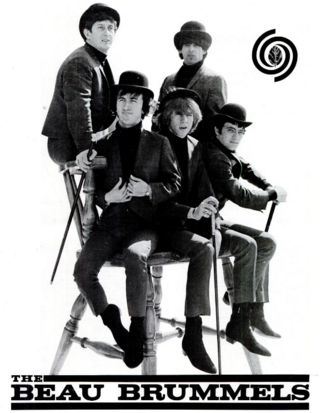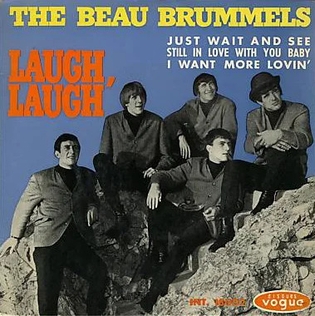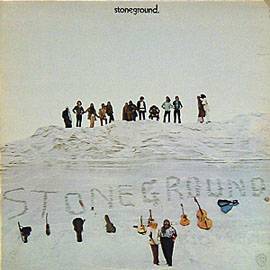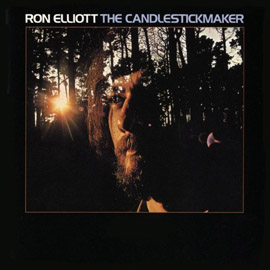
The Beau Brummels were an American rock band. Formed in San Francisco in 1964, the band's original lineup included Sal Valentino, Ron Elliott, Ron Meagher, Declan Mulligan, and John Petersen (drums). They were discovered by local disc jockeys who were looking to sign acts to their new label, Autumn Records, where Sylvester Stewart—later known as Sly Stone—produced the group's early recording sessions. Initially, the band's musical style blended beat music and folk music and typically drew comparisons to the Beatles, while their later work incorporated other music genres such as psychedelic rock and country rock.

"Laugh, Laugh" is a song by American rock group the Beau Brummels, written by guitarist Ron Elliott and produced by Sylvester Stewart, later known as Sly Stone. Released in December 1964 as the band's debut single, the song reached number 15 on the U.S. Billboard Hot 100 chart the following February. "Laugh, Laugh" was the first hit single to come out of the emerging San Francisco music scene in response to the British Invasion. The song was later included on the band's first full-length album, Introducing the Beau Brummels, released in April 1965.

Sal Valentino is an American rock musician, singer and songwriter, best known as lead singer of The Beau Brummels, subsequently becoming a songwriter as well. The band released a pair of top 20 U.S. hit singles in 1965, "Laugh, Laugh" and "Just a Little". He later fronted another band, Stoneground, which produced three albums in the early 1970s. After reuniting on numerous occasions with the Beau Brummels, Valentino began a solo career, releasing his latest album, Every Now and Then, in 2008.

"You Tell Me Why" is a song by American rock group The Beau Brummels, from the band's second album, The Beau Brummels, Volume 2. The song was written by guitarist Ron Elliott and produced by Sylvester Stewart, later known as Sly Stone. "You Tell Me Why" was released as the album's lead single, and peaked at number 38 on the Billboard Hot 100 in August 1965. The band revisited the song and included it on their 1975 eponymous album. The original version later appeared on the band's 1987 compilation album The Best of The Beau Brummels 1964–1968.

Triangle is the fourth studio album by American rock band the Beau Brummels. Produced by Lenny Waronker and released in July 1967, it was the band's first album to include songs that vocalist Sal Valentino and guitarist Ron Elliott composed together. The band incorporated fantasy elements and surreal characters into the album's song titles and lyrics, and worked with a variety of session musicians to create Triangle's psychedelic musical style. The Beau Brummels were reduced to a trio—Valentino, Elliott, and Ron Meagher—at the time Triangle was recorded, as former group members Don Irving (guitars) and John Petersen (drums) left the band following the release of the group's previous album, Beau Brummels '66.

"Just a Little" is a song by the American rock group the Beau Brummels. The song is included on the band's debut album, Introducing the Beau Brummels, and was released as its second single, following "Laugh, Laugh". "Just a Little" became the band's best hit parade U.S. single, which peaked at number eight on the Billboard Hot 100 in June 1965. It also reached no lower than position #10 of the hit parades in Canada and Australia.

Bradley's Barn is the fifth studio album by the American rock group the Beau Brummels. Released in October 1968, it contains the singles "Long Walking Down to Misery" and "Cherokee Girl." The album has received critical acclaim as an early example of country rock. The album was named after the recording studio owned by Owen Bradley where the album was recorded.

The Beau Brummels were an American rock band that formed in 1964 and originally consisted of singer Sal Valentino, lead guitarist Ron Elliott, bassist Ron Meagher, rhythm guitarist Declan Mulligan and drummer John Petersen. Local radio disc jockeys Tom Donahue and Bobby Mitchell discovered the band at a club near San Francisco. They signed the Beau Brummels to their fledgling Autumn Records label, and their house producer, Sylvester Stewart, later known as Sly Stone, recorded the band's early sessions.

The Beau Brummels, Volume 2 is the second studio album by the American rock group the Beau Brummels. Released in August 1965, the album contains the U.S. top 40 hit "You Tell Me Why" and follow-up single "Don't Talk to Strangers."

Ronald Charles Elliott is an American musician, composer and record producer, best known as songwriter and lead guitarist of the rock band The Beau Brummels. Elliott wrote or co-wrote the band's 1965 U.S. top 20 hits "Laugh, Laugh" and "Just a Little". In addition to reuniting with the Beau Brummels on occasion over the years, Elliott released a solo album in 1970, and has played on and produced albums by a number of other artists.

"Here We Are Again" is a song by American rock group The Beau Brummels. It was released in 1966 as the band's second single on Warner Bros. Records, following their cover of Bob Dylan's "One Too Many Mornings," released earlier that year. "Here We Are Again" was the first Beau Brummels' A-side written by lead vocalist Sal Valentino.
"Magic Hollow" is a song by American rock group The Beau Brummels, from the band's fourth album, 1967's Triangle. The song, written by guitarist Ron Elliott and lead singer Sal Valentino, was released as the album's first single. The song appeared on the band's 1987 compilation album The Best of the Beau Brummels 1964-1968, and "Magic Hollow" also served as the title of the band's 2005 four-disc box set.

The Beau Brummels is the sixth studio album by the American rock band of the same name. Released in April 1975, the album features the work of all five original band members for the first time since the band's debut album, 1965's Introducing the Beau Brummels. The album peaked at number 180 on the U.S. Billboard 200 albums chart in 1975.

John Declan Mulligan was an Irish-born American musician, best known as a guitarist of rock band The Beau Brummels in the 1960s.

Live! is a live album by American rock group The Beau Brummels. The album, released in August 2000 by Dig Music, was recorded in February 1974 near Sacramento, California, shortly after it was announced that the band had reunited. The album includes a mix of performances of their most commercially singles, including "Laugh, Laugh" and "Just a Little," as well as then-new material, some of which would be recorded for the band's 1975 eponymous studio album.

Stoneground is the debut studio album by American rock band Stoneground, released in 1971 on Warner Bros. The album featured seven different lead vocalists, including Sal Valentino on four of the album's ten songs.

Family Album is the second album by American rock band Stoneground, a double album released in late 1971 on Warner Bros, consisting of live and studio recordings of original songs and covers.

Stoneground 3, sometimes stylized as Stoneground Three, is the third album by American rock band Stoneground, released in 1972 on Warner Bros. It was the final studio album to feature the band's original lineup, as eight of the ten members quit shortly after the album's release.

The Candlestickmaker is the lone solo album by American musician Ron Elliott, released in 1970 on Warner Bros. It was recorded following the dissolution of The Beau Brummels, with whom Elliott had been the chief songwriter and guitarist. A two-part, fifteen-minute piece titled "The Candlestickmaker Suite" comprises the entire second side of the album.

Hearts of Stone is the fifth studio album by American rock band Stoneground, released in 1978 on Warner Bros. Produced by Bob Gaudio, it marked Stoneground's return to a major label, having released their previous album, Flat Out (1976), on their own label. "Prove It" was released as the first single from Hearts of Stone.



















